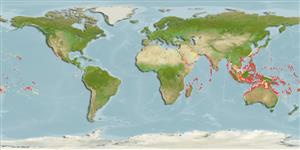Environment: milieu / climate zone / depth range / distribution range
นิเวศวิทยา
เกี่ยวกับทะเล,น้ำเค็ม เกี่ยวกับหินโสโครก; ไม่มีการอพยพย้ายถิ่น; ระดับความลึก 0 - 80 m (Ref. 128797). Tropical; 35°N - 35°S
Indo-Pacific: Red Sea (Ref. 7247) and East Africa to Samoa and Tonga (Ref. 53797), north to the Ryukyu Islands, south to New Caledonia.
ขนาด / น้ำหนัก / Age
Maturity: Lm ? range ? - ? cm
Max length : 10.5 cm TL เพศผู้/กระเทย; (Ref. 90102)
Short description
เครื่องมือที่ใช้ในการแยกชนิดสัตว์,สิ่งมีชีวิตออกจากกัน | สัณฐานวิทยา | ความยาวต่างๆ
เงี่ยงครีบหลัง (รวม) : 12 - 13; ก้านครีบอ่อนที่หาง (รวม) : 10 - 12; เงี่ยงครีบก้น: 2; ก้านครีบอ่อนที่ก้น: 10 - 12.
Schools are found above branching corals along upper margins of clear lagoon and outer reef slopes. Often associated with branching Acropora. Oviparous, distinct pairing during breeding (Ref. 205). Eggs are demersal and adhere to the substrate (Ref. 205). Males guard and aerate the eggs (Ref. 205). Diurnal species (Ref. 54980, 120737).
Life cycle and mating behavior
Maturities | การสืบพันธุ์ | Spawnings | Egg(s) | Fecundities | ตัวอ่อน
Oviparous, distinct pairing during breeding (Ref. 205). Eggs are demersal and adhere to the substrate (Ref. 205). Males guard and aerate the eggs (Ref. 205).
Allen, G.R., 1991. Damselfishes of the world. Mergus Publishers, Melle, Germany. 271 p. (Ref. 7247)
IUCN Red List Status (Ref. 130435)
Threat to humans
Harmless
Human uses
การประมง: ไม่มีผลประโยชน์; สถานที่แสดงสัตว์และพืชน้ำ: การค้า
เครื่องมือ
Special reports
Download XML
แหล่งที่มาจากอินเตอร์เน็ต
Estimates based on models
Preferred temperature (Ref.
123201): 24.6 - 28.9, mean 27.7 °C (based on 666 cells).
Phylogenetic diversity index (Ref.
82804): PD
50 = 0.5000 [Uniqueness, from 0.5 = low to 2.0 = high].
Bayesian length-weight: a=0.02291 (0.01321 - 0.03973), b=3.04 (2.89 - 3.19), in cm total length, based on LWR estimates for this species & Genus-body shape (Ref.
93245).
ระดับชั้นอาหาร (Ref.
69278): 3.4 ±0.45 se; based on food items.
ความสามารถในการกลับคืนสู่ปกติ (Ref.
120179): ความสูง, เวลาต่ำสุดที่จะทำให้ประชากรเพิ่มขึ้นเป็น 2 เท่าใช้เวลาน้อยกว่า 15 เดือน (K=4.0).
Fishing Vulnerability (Ref.
59153): Low vulnerability (10 of 100).
Nutrients (Ref.
124155): Calcium = 112 [55, 177] mg/100g; Iron = 0.839 [0.490, 1.399] mg/100g; Protein = 18.3 [17.1, 19.4] %; Omega3 = 0.126 [0.071, 0.213] g/100g; Selenium = 23.5 [11.8, 47.1] μg/100g; VitaminA = 152 [45, 491] μg/100g; Zinc = 1.45 [0.95, 2.09] mg/100g (wet weight);
